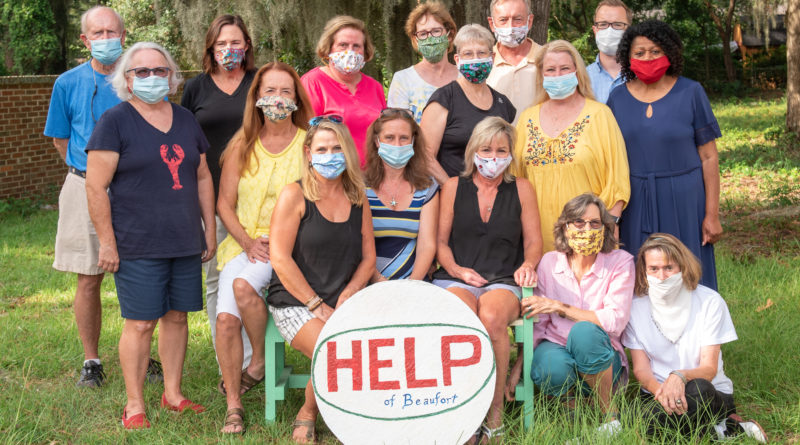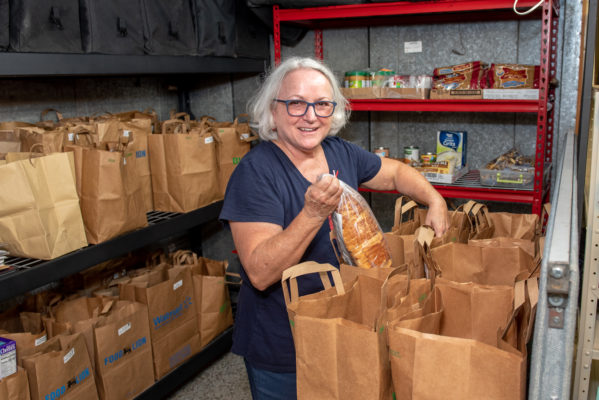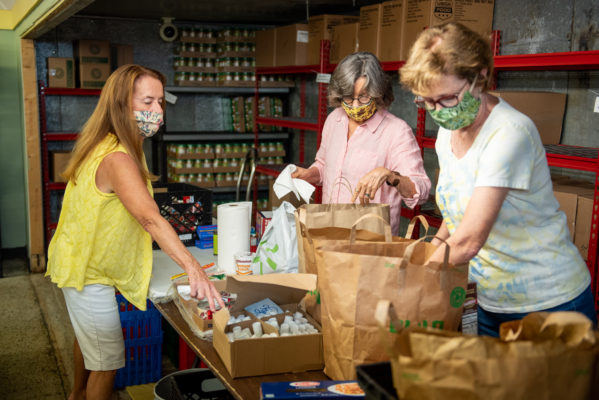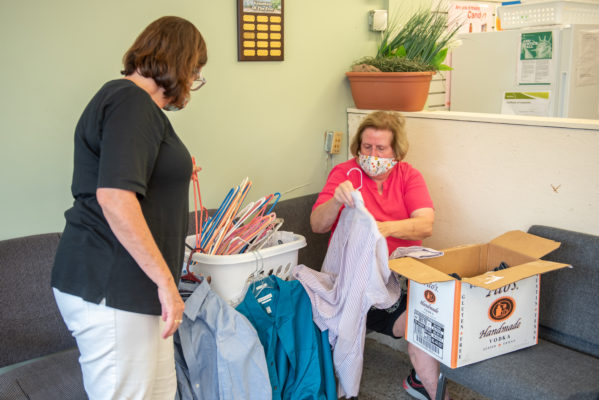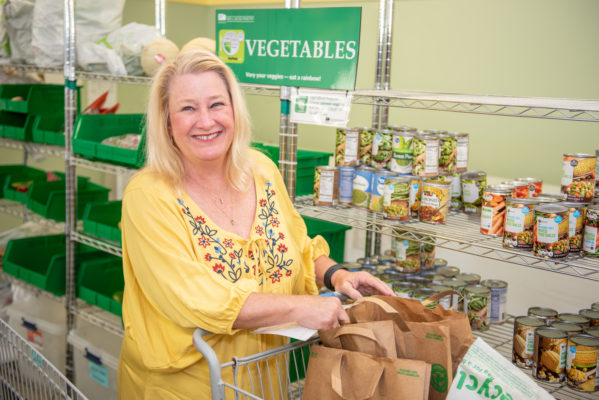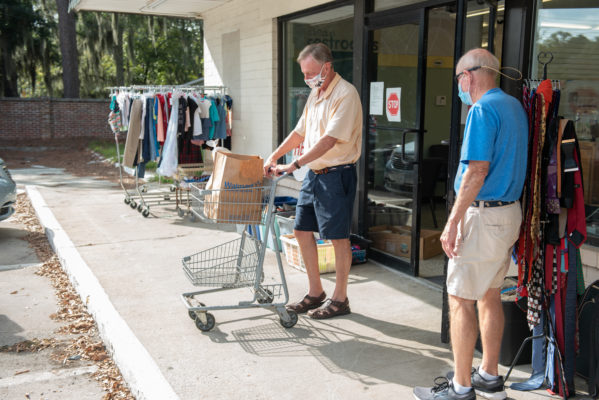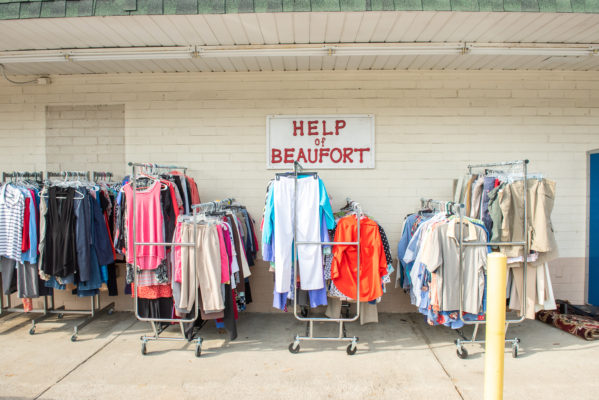HELP of Beaufort
Meeting the Needs of Those Facing Hunger in the Lowcountry
story by KAREN SNYDER photos by CHARLOTTE BERKELEY
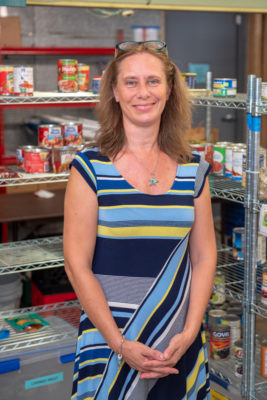
For more than 45 years, HELP of Beaufort has been the safety net of our community. Now, as the Lowcountry faces the additional burden of a pandemic, this nonprofit organization is weaving that net even stronger as it serves an unprecedented number of families and individuals in need.
HELP of Beaufort’s Executive Director Lori Opozda sees the need each and every day in her role leading a staff of about two dozen volunteers who serve some 100-125 clients each week. “Through all the challenges that COVID-19 has brought our way,” says Opozda, “we never shut down. We’re here providing our services five days a week from 9:30 a.m. to 12:30 p.m. each day.”
HELP of Beaufort provides a food pantry, a Mobile Meals program, clothing, some smaller household items, and limited amounts of financial assistance to those in need. Having relocated to its new location at 1810 Ribaut Road in Port Royal last February, Opozda says, “It’s now much easier for those who want to drop off donations to find us and for our clients to pick up what they need.”
After volunteering for the organization for about five years, Opozda took on the role of executive director after the previous director moved back to New York in September 2019. “Years ago I started out volunteering at HELP of Beaufort once or twice a week, eventually becoming the head of the pantry. When the director vacancy came about, I agreed to serve as the interim director until the end of the year. Having already had a lot of knowledge about the pantry, what’s needed to stock it, and what goes out the door, it became clear that the job was a natural fit for me.”
In January, the12-member board offered Opozda the position and she agreed!
But as the saying goes — timing is everything! Six weeks after accepting the position, Opozda and HELP of Beaufort hosted the grand opening of its new location (relocating from the Burton area) and about a month later COVID-19 struck. Suddenly, she says, the pipeline of resources the organization depended upon came to a screeching halt just as they were needed the most!
“Each week we were used to getting donations from churches, schools, businesses, and restaurants. But once everything closed down, we saw about a 30 percent decrease in donations — just as, for example, the need for our Mobile Meals program for those unable to leave their homes increased steadily. We spend about $1,200 per month just on that program alone,” she adds.

Restaurants, which often donated a portion of their sales to HELP of Beaufort during “give back” nights, were facing shutdowns or limited capacity themselves, and schools and churches were closed. “This was happening right as people became suddenly unemployed or were finding their work hours cut back. Before the pandemic, most of our clients were from households of 1-3 people. But now, 80 percent of the people we’re serving are families of 3-6 people,” says Opozda. She explains that many of her new clients are grandparents who now have more mouths to feed since they are watching grandchildren at home during virtual schooling or babysitting while parents work.
“With evictions going on, utility bills piling up, and no income coming in, it’s hitting almost every type of household out there. The biggest piece of advice I offer those in this situation is to visit their local food banks for help. This will alleviate money being spent on family groceries so that it can be paid toward their water bill, electric bill, or rent,” she advises.
It was during the time that the pandemic first impacted everyone’s daily life that Amy Kraft, a local substitute teacher and personal assistant, decided she needed to step up to the plate to help those who were struggling. “In April, I saw an announcement from the Lowcountry Food Bank asking for volunteers for a food distribution event being held at Beaufort High School. So, I went. In just a few hours, we served over 400 cars of individuals who received one box of perishable food items and one box of nonperishable items,” says Kraft.
“I was handling traffic control and the cars were backed up to US-21. You couldn’t get on to Lady’s Island that day. That’s when the need became real to me. As I waved people through the line, they waved back at me saying, ‘Bless you and thank you,’ showing so much gratitude during such difficult times.”
“It brought me to my knees. I couldn’t believe the volume of cars. I know that I am abundantly blessed, and I am so grateful that I am. It served as a real ‘check in’ moment for me.”
Shortly thereafter, a friend of Kraft’s invited her to come along one morning as she volunteered at HELP of Beaufort. Both she and her friend, a Yoga instructor, found their personal work schedules impacted by the pandemic closings of schools and businesses, so they were able to offer their time.
“We’ve actually seen an increase in volunteers at the pantry since COVID-19 hit,” says Opozda, explaining that many people who found themselves out of work were willing to volunteer their time. “Before COVID-19, we actually operated on a skeleton crew, but now we’re thankfully adding more volunteers as the community’s needs are increasing. People usually volunteer 1-2 days a week, and we schedule them wherever there’s a need, whether it’s helping the pantry, with clothing, or the front desk.”
Kraft admits she and a few friends, who volunteer together on Wednesdays, laugh and enjoy their time “shopping the aisles” as they gather groceries for their clients. “One of my favorite things is checking with clients to see if any of the children in their family are having an upcoming birthday. If so, we give them a ‘birthday bag’ tied up with ribbons with cake, icing, and candles inside. We’re also sure to ask those who have little ones if they need extra diapers or formula.”
“Again, we hear so many ‘thank-yous’ from the people we serve. Each and every person is so appreciative,” says Kraft, who also noticed a significant increase in the number of families served each week, “especially when federal assistance ended this summer.”
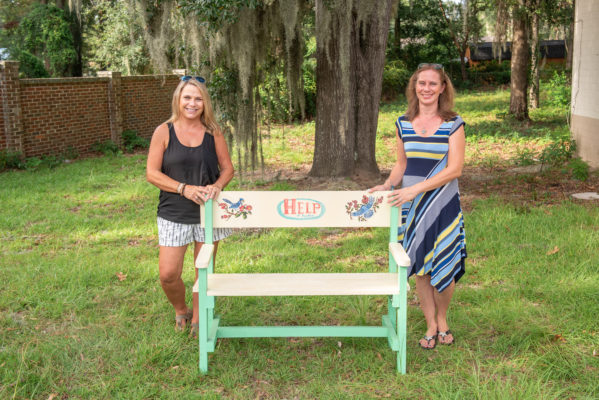
Kraft, who celebrated a birthday in September, found a way to help meet that increased demand. On her birthday, she created an Amazon wish list and published it on her personal Facebook page. “The list contained over 45 items. It was an easy way for people who may not have time to physically shop for items to support us. By the next day, we had Amazon boxes arriving!” Kraft encourages others to visit the HELP of Beaufort’s website or Facebook page to contribute to the Amazon wish list. “There are just some items like tomato products and canned fruits that we’re always in need of.”
Currently, due to COVID-19 safety requirements, clients who are registered with HELP of Beaufort receive their food and clothing items curbside. Those seeking assistance receive help — based on the number of persons in their family — on a once-per-month basis after completing an application and providing identification.
Keeping up with demand for food is the organization’s biggest challenge these days. “I was headed home on a Friday,” recalls Opozda, “when I noticed that we were short of vegetables needed on Monday morning. So, I headed to the grocery store and spent several hundred dollars on canned foods. By Wednesday, everything was already gone!”
Serving anywhere from 15-20 cars in a three-hour period daily, the organization is grateful for the various sources of food they receive. According to Opozda, as a USDA-certified wellness pantry, they receive 5-7 pallets of food from Fresh Express for about $250. Our next Fresh Express delivery is scheduled for October 20 and is free and open to the public.”
Other food charities help as well, such as Second Helpings, a food rescue organization that collects soon-to-be-expired items from grocery stores and delivers them directly to food banks for fast distribution.

“We receive a delivery from them every Monday. We’ll get both meat and produce. But even those deliveries slowed down when grocery stores were having fulfillment issues. Some weeks they were completely out of meat. However, they’ve been very generous to us, providing anywhere from 300 to 1,000 pounds of food per week. If we know we’re a little low on meat products and they have some left on the truck, they provide it to us.” Local farmers also bring by extra fresh produce when they have it, she adds.
Yet, the best advice Opozda offers to keep the shelves stocked “is to simply add us to your weekly grocery list. The main thing for people to remember is that donations are needed on a weekly basis. If we go a week without donations, then we have to buy our groceries. It’s a huge help if people can keep us on their weekly grocery lists and buy a bag of groceries for HELP of Beaufort when they’re buying theirs.” Donations are accepted anytime Monday through Friday from 9:30 a.m. to 12:30 p.m. “Please jot us down on your grocery list and don’t forget about us,” she urges.
HELP of Beaufort sponsors many fundraising events throughout the year to support the ongoing needs of the Lowcountry residents. Some of these annual events include smoked Boston Butt sales for the 4th of July, Labor Day, and Christmas holidays; smoked ham for Easter; and chicken and ribs for Memorial Day weekend. Also, the organization had planned to sponsor its first annual 5K walk last spring but had to postpone it due to COVID-19.
“We’re especially grateful for all our business and community sponsors who continue to support us in many different ways,” adds Opozda. Some of these sponsors includes: Turbeville Insurance, Butler Dodge, Sutcliffe Golf Carts, VinCo ATM Services, and Sea Eagle Market, among others.
“We’re also appreciative of Ameris Bank, who is sponsoring a food drive for us during the whole month of October. People can drop off their food donations at their closest Ameris Bank location.”
Those seeking to support HELP of Beaufort through their recurring or one-time financial contributions may do so by visiting the website at www.helpof beaufort.org or may stop by the store with a financial donation.
Says Kraft, “Get involved if you can. It’s the sheer volume of people in need of all ages and colors in our community that really surprised me until I experienced it firsthand through volunteering. By giving of ourselves, we not only show empathy for others but you’re really giving back to yourself, too.”

